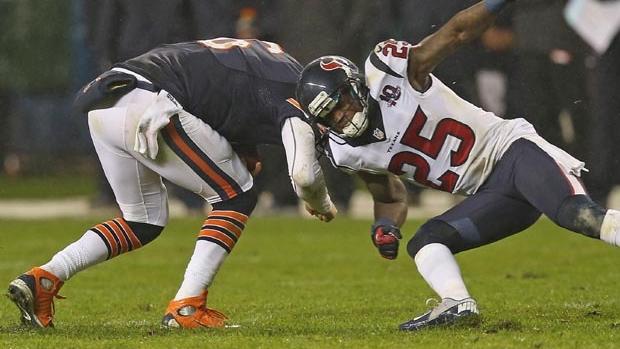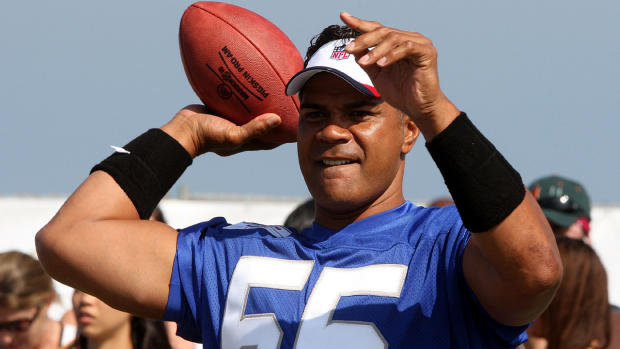$765M NFL concussion settlement may not be enough, judge says
PHILADELPHIA -- A federal judge denied preliminary approval of a $765 million settlement of NFL concussion claims, fearing it may not be enough to cover 20,000 retired players.
U.S. District Judge Anita B. Brody asked for more financial analysis from the parties, a week after players' lawyers filed a detailed payout plan.
"I am primarily concerned that not all retired NFL football players who ultimately receive a qualifying diagnosis or their (families) ... will be paid," Brody wrote in a 12-page opinion issued Tuesday.
The proposed settlement, negotiated
over several months, is designed to last at least 65 years.
Florida-based lawyer Sia Nejad, who specializes in insurance defense, told CBSSports.com that this rejection is a matter of wanting the NFL to "show its work."
"At this point, it seems that Judge Brody is doubting that the $765
million is sufficient to cover the players and that some of the parameters to
qualify for portions of the settlement monies are too narrow or
restrictive," Nejad said. "Bottom line, she wants the lawyers to
'show their work' because she's doubting the fairness of the agreement."
"Sure, $765 million sounds like a lot of money, but with the business of the NFL better than ever and the new TV contract just kicking in and labor costs fixed through this 10-year CBA (collective bargaining agreement) and young talent on their rookie contracts cheaper than ever, well, trust me, this is chump change," he wrote.
But the players' lawyers said they will face huge challenges just to get the case to trial. They would have to prove the injuries were linked to the players' NFL service and should not be handled through league arbitration.
Sol Weiss, a lead lawyer for the ex-players, remained confident the class-action settlement will ultimately be approved.
"I am very confident that the (actuarial) people we used are right, and that there will be enough money to cover these claims for 65 years," Weiss said.
More than 4,500 former players have filed suit, some accusing the league of fraud for its handling of concussions. They include former Dallas Cowboys running back Tony Dorsett and Super Bowl-winning quarterback Jim McMahon, who suffers from dementia.
Layn R. Phillips, a former federal judge from California hired by Brody to lead settlement negotiations, had called the deal fair.
The settlement would include $675 million for compensatory claims, for players with neurological symptoms; $75 million for baseline testing for asymptomatic men; and $10 million for medical research and education. The NFL also would pay an additional $112 million to the players' lawyers for their fees and expenses, for a total payout of nearly $900 million.
With the preliminary rejection in hand, the two sides could try to assure the judge the money will last or raise the fund amount to ease her concerns. They also could try to start over.
Brody is expected to hold a hearing sometime this year at which critics could challenge the settlement terms. She would then decide whether or not to grant final approval. Retirees could opt out of the settlement and sue the league individually, but there is no guarantee they would ever get to trial or see any money.
The judge last month named Perry Golkin, a longtime executive at the investment firm Kohlberg, Kravis, Roberts & Co., as a special master to advise her on the case.
The players' lawyers filed a few hundred pages of documents and exhibits last week, but Brody asked for more analysis to bolster their claim that the money won't run out.
"Unfortunately, no such analyses were provided to me in support of the plaintiffs' motion. In the absence of additional supporting evidence, I have concerns about the fairness, reasonableness, and adequacy of the settlement," Brody wrote.
The National Institutes of Health and the NFL are working together to learn more about the effects of traumatic brain injuries.
Currently, a degenerative brain disease called chronic traumatic encephalopathy (CTE), that has been linked to repeated traumatic brain injuries, can only be diagnosed after death. Patients who suffer from CTE often exhibit Alzheimer's-like symptoms like memory loss, mood swings, cognitive issues, depression confusion, aggressive behavior and problems with motor skills.
Football player Junior Seau was diagnosed with CTE after he committed suicide.
UCLA announced that they had developed testing to diagnose CTE in living patients, including Dorsett, but the tests are still preliminary.

